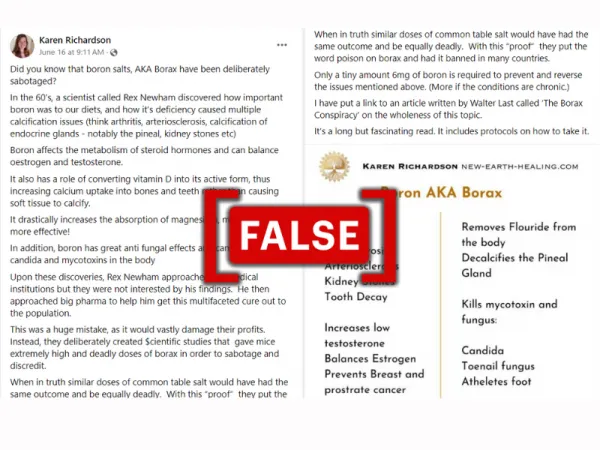By: Kari Nixon
June 24 2024
 A facebook post promotes the consumption of Borax powder, claiming that its safety testing was sabotaged by Big Pharma.
A facebook post promotes the consumption of Borax powder, claiming that its safety testing was sabotaged by Big Pharma.
Boron and borax are not the same thing, and the man cited in the Facebook post was not a doctor or scientist.
The claim
On June 16, 2024, a Facebook post (archived here) claimed borax is both safe and necessary to consume, and pharmaceutical studies showing the opposite were rigged.
The post grounds its statements in a purported history of nutritional science, specifically the claimed nutritional benefits of boron and the process of assessing borax's safety for human consumption.
The post claims, among other things, that a scientist named "Rex Newham" discovered the nutritional importance of boron in the 1960s. At that point, he approached "medical institutions" and "big pharma" with his findings. It's claimed these findings prompted pharmaceutical companies to systematically sabotage safety studies of borax.
The author states that only six milligrams of boron are required to "prevent and reverse" issues such as arthritis, unbalanced hormones, and fungal infections. An infographic titled "Boron AKA Borax" is attached to the post, elaborating upon these proclaimed benefits.
As of June 21, 2024, this post had 1,700 views and 241 shares.
In fact
Borax is not the same thing as boron, although this is a key false claim reiterated by those who encourage the consumption of borax. While boron is a chemical element on the periodic table, borax is a chemical compound made using boron and other substances. Boric acid and borax are also not chemically identical. Boron is a naturally occurring element, but boric acid and borax are compounds derived from it, which are often used as pesticides.
While boron has some health benefits, it has never been classified as an essential nutrient for human health because its exact role in bodily processes is still unclear. The National Institutes of Health – the primary U.S. agency for conducting and supporting medical research – clarifies that boron "might have beneficial effects." Still, the science remains uncertain because "research has not yet identified a clear biological function" for boron. Further complicating matters is that the Institute of Medicine's Food and Nutrition Board deemed there insufficient evidence even to establish a recommended daily value of boron intake.
Boron levels in humans are also not routinely measured by clinicians, giving us a very limited picture of baseline population levels. Additionally, the studies that show potential health benefits of boron are usually quite weak, with few participants or methods that make it difficult to prove boron's role in the improvement shown.
Scientists today are also unsure exactly how much boron might benefit people, but it is widely agreed that most people get boron through plants in their diets.
The safety of borax and boric acid
A key claim of the post is that borax/boron had newly discovered benefits as of 1960, which the pharmaceutical industry then swept under the rug. Borax has been widely advertised as a soap extract since the late 1800s. Studies of both borax and Boron have been conducted since the mid-1850s, not the 1960s, as the author claims.
Since the late 1890s, scientists and nutritionists have debated whether or not borax and boric acid are safe for human consumption. One study from 1904 found that doses of even 0.5 grams of borax or Boric acid daily "is too much for the normal [hu]man to receive regularly." Another study from 1899 declared it apparently safe for animal usage – though it should be noted that the chief complaints of nausea and lethargy seen in the previous study are subjective experiences that animals would be incapable of describing.
As such, the nutritional role of borax and its potential use in human consumption are not new issues, and their safety or lack thereof has been debated for some time.
Rex Newnham
The post's author misleadingly cites a scientist named "Rex Newham," a misspelling of Rex Newnham, as the originator of the boron studies in the 1960s. Although he did study the dietary impact of boron, Newnham's credentials are widely discredited, and his reputation among the scientific community is poor.
He obtained a PhD in nutrition but considered homeopathy one of his specialties. According to his writings, Newnham began to find "out all that [he] could about boron" and its toxicity as a potential cure for his arthritis. Based on his reading, he began taking just under the toxic dose and studied the effects qualitatively on himself.
He conducted no actual scientific studies because although he was, according to himself, "a naturopath, homeopath, and nutritionist," he was "too old to start" a medical degree. When he was fined in his home country for selling "poison" to people, he traveled to the Global South, diagnosing trees, dogs, and people with Boron deficiency in Jamaica, Mauritius, and rural parts of New Zealand and Australia. He does not state whether he prescribed them borax.
Consumption of non-food-grade products
While the nutritional value of boron is somewhat uncertain, commercially available boron supplements are widely available. Borax, by contrast, is not tested or produced to be safe for human consumption and should not be eaten or consumed as a substitute for safely produced boron tablets. Consumption of borax can be very dangerous, leading to vomiting, nausea, and death.
Logically Facts has previously fact-checked similar claims about the safety and health benefits of borax.
The verdict
Borax is toxic for human consumption. It is not the same as boron, a mineral whose usefulness in the human body remains unclear. Therefore, we have marked this claim as false.